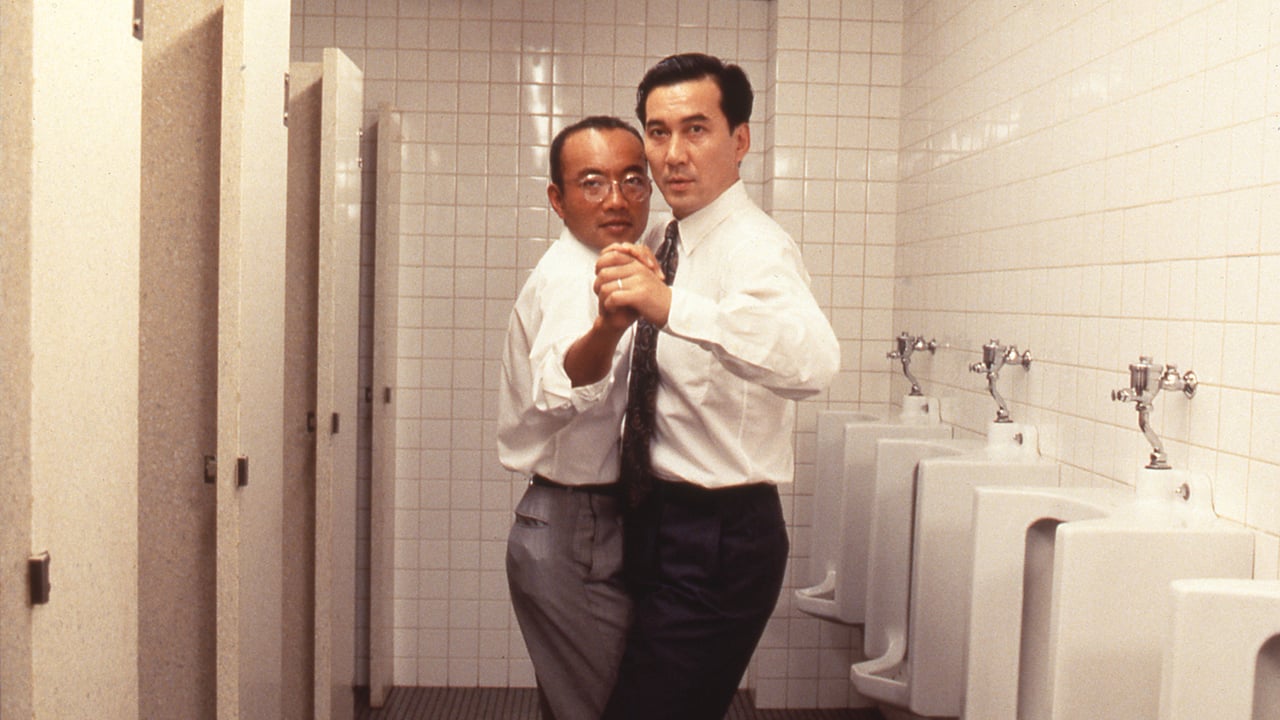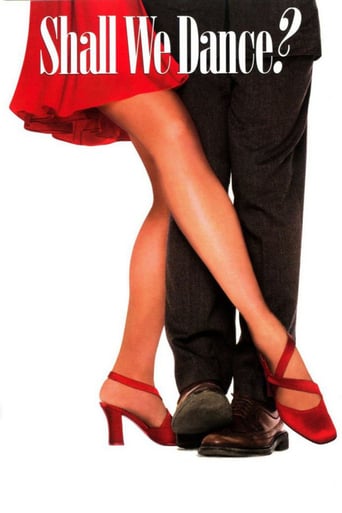DipitySkillful
an ambitious but ultimately ineffective debut endeavor.
SanEat
A film with more than the usual spoiler issues. Talking about it in any detail feels akin to handing you a gift-wrapped present and saying, "I hope you like it -- It's a thriller about a diabolical secret experiment."
Teddie Blake
The movie turns out to be a little better than the average. Starting from a romantic formula often seen in the cinema, it ends in the most predictable (and somewhat bland) way.
Lela
The tone of this movie is interesting -- the stakes are both dramatic and high, but it's balanced with a lot of fun, tongue and cheek dialogue.
Lee Eisenberg
As I understand it, much of the humor in "Shall We Dance?" derives from the stereotype of the Japanese businessman. A businessman in the Land of the Rising Sun is supposed to be very serious and motivated, as Shohei Sugiyama (Kōji Yakusho) is. He's successful but unfulfilled. But taking dancing lessons just might change that.Much like Baz Luhrmann's "Strictly Ballroom", "Shall We Dance?" shows that dancing is a physical form of communication. Shohei feels cut off from his wife and daughter, but the dance lessons help him open up. The movie knows how to present everything just right so that it comes across naturally and without seeming like a cliché. There was an American remake, but I have no plans to ever see that one.
jkalvin-1
This is the original Shall We Dansu, a Japanese film that takes a look at the society around it and the shameful act of dancing. It is considered out of the society's norms to dance, whether it is in a studio or at home, especially ballroom dancing. This is exactly what the main character Shohei Sugiyama is looking for to break from his mundane life. While the topic of the film is better understood with the knowledge of Japanese culture it is still hilarious to watch while still maintaining its heart-felt plot.Shall We Dansu has a very serious plot of a man trying to break from his daily routine, but also adds in a slew of comedy through gags and dialog. Some scenes are laugh out loud while others just give a chuckle to break up tension. However, this is a very funny film with a very interesting story line.The one thing to be aware of is that this is the original Japanese version. There has been a more recent Hollywood version that falls very short in comparison. The Hollywood version was a flop and took an amazing movie and turned it into a pointless waste of time. Do not see the remake; instead look at this original film, which is able to captivate humor and drama all in the same moment.The most important thing to understand about this film is that in this Japanese society it is taboo to dance. If you try to place this film outside of that context, like how the remake attempted, it loses everything that makes this film worth seeing. While analyzing society, and the norms of that society, Shall We Dansu is a captivating experience that mixes humor with drama to allow for an entertaining film experience.
juniperland
Instead of reiterating the many thoughtful statements about this movie, I'd like to add the following comments about how this film compares to the American version, in case you were wondering which to watch. I've seen the Japanese film (full length and cut) 4 or 5 times, including once in the original Japanese, and I've seen the American version twice. 1) The Japanese film is ultimately better as it stays with you for years, but I respect the attempt to make a fairly faithful Western adaptation out of a story whose heart depends on being Japanese. 2) A big difference is that the Japanese film uses dance as simply part of the story, while the American version relies on flashy music and more expert dancing to capture the audience, not trusting the story to work by itself. The Japanese dancing is more credible -- Richard Gere becomes a twinkle toes too quickly. 3) Both stories show how one middle-aged man deals with his feelings of being trapped in routine, by doing something difficult and beautiful: ballroom dancing. Although he starts out with a crush on a beautiful dancer, he soon moves on to dance for its own sake. But in Japan, ballroom dancing is much less acceptable. 4) Both films have great supporting characters and story lines, but the American version is more rushed and crowded. 5) The Japanese star is very reminiscent of Gregory Peck -- and even Richard Gere cannot fill those shoes -- but both are handsome and acquit themselves very well in their versions of this movie. 6) The Japanese film has a wonderful storyline about marriage that is more subtle and touching than the American movie version (where Susan Sarandon is too on the nose in some of her speeches). The Japanese wife of the man with a secret dancing life is a terrific supporting character. She moves from contentment to worry to sadness as she tries to figure out what her once reliable husband is doing when he stays out late. Her reactions add poignancy and depth to the entire story, and contribute to the final satisfaction with this movie. 7) Jennifer Lopez is NOT terrible in the American version. I've been watching ballroom dancing for many years, and enjoyed watching her in the American film. I guess she is somebody some people love to hate, but she has matured and here is elegant and credible as the competitive ballroom dancer. The Japanese dancer actually seems more like a ballet dancer than a ballroom dancer, but why quibble? Both women are lovely. 8) The American film has more memorable music, but the scene where the lead dances to "Shall We Dance" is delightful in both. 9) Watch the Japanese film first, when you are in the mood to get absorbed in the characters' lives. Then wait a few weeks to watch the American film, and watch it when you are in the mood to dance along. The soundtrack is great.
olgaryabaya
Have you ever danced? For most the simple answer is yes, and then of course we each like to add either our stories or explanations. For women these stories are usually pleasant, either their first dance at school, or they actually had dance training when they were younger. But for men, the tables turn. If they had ever danced, they usually say they were forced into it, that it was "only for a little while" or that they simply hated it. We all know that dancing cannot possibly be that horrendous or painful, then why do so many men find it necessary to cover-up their dancing, especially if it was out of personal interest. Now, imagine yourself in a society where dance is socially forbidden, not in any shape or form, not between husband and wife and most definitely not out of personal interest. It is considered shameful, embarrassing – but it is an escape, a way to enter an alternate universe of your life in a split second, would you do it? What if dancing forced you into secrecy and as hard as you tried to deny it, it became your passion. Would you let dancing go because of society or would you keep it close to your heart forever, if your heart deems it necessary?Mr. Sugiyama was a successful Japanese businessman, a "salary-man" who stayed late at work and went out with co-workers afterward, a custom necessary for your success within a company. Usually coming home late, he knew that tomorrow was going to be the same as the day before and the 20th day from now; his life has been set for him. On the train on the way back home he notices a young woman looking out a window on the top floor of a building. She catches his attention immediately and after many debates with himself, over several days, he decides to come see her, only to find out it is a dancing establishment. He gives it a chance nonetheless, and once he finds Mr. Aoki, a fellow co-worker, hiding behind a wig at this same establishment, he starts to gain confidence and awareness that maybe it is alright to enjoy dance. He becomes engrossed in it, disciplining every aspect of his dancing whether on the train or even at work, and dance gives life to him, showing in simply the way he rides his bike. Yet Mai, the woman who first caught his attention and an instructor within the school, has seemed to lose this passion that he just found for dance. It takes one dancing competition, in which Mr. Sugiyama participates and Mai instructs him, for both of them to face their fears, define their personal meaning of dance, and determine what is truly important and necessary in their lives. Maybe not everyone can relate to dancing, but there may be something that each of us has in our hearts to do that we are simply forbidden. Moreover, I believe this picture correctly portrays the passions of humankind, the lack thereof, and the effects of both on the human being. The director allows us to see Mr. Sugiyama's transformation, how Mr. Sugiyama first develops his passion for dance showing no longer just at the dance school, but everywhere else, at work and at home. In contrast, the director shows Mai, an almost stoic woman who has this opportunity to dance and yet it no longer brings life to her. The acting is wonderful and we are left wondering what it is that happened to her and whether Mr. Sugiyama will continue to dance. However, something seems to be missing in this film. I believe the director could have given more life to the picture itself, especially when representing something so expressive as dance. It may be that factor that I have danced before, but other than some short scenes at the beginning or end, this picture lacked an artistic aspect to give life to the passions of those involved. There is only so much that a storyline and acting can provide, and the artistic element fills in the vacancies. For me, the director failed to do so, both within the dance studio and during the competitions.

